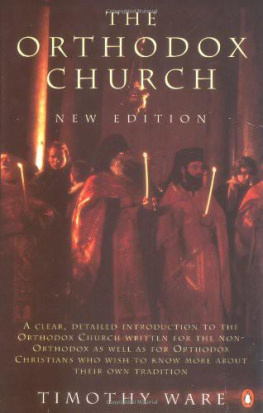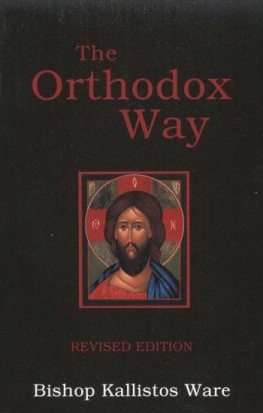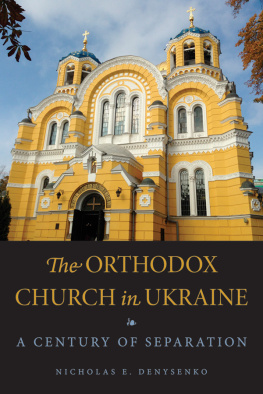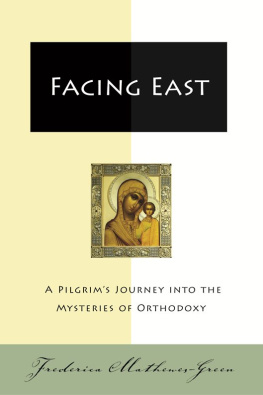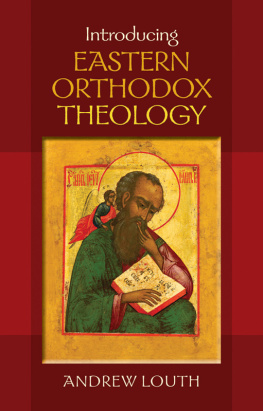
PENGUIN BOOKS
THE ORTHODOX CHURCH
Timothy Ware was born in Bath, Somerset, in 1934 and was educated at Westminster School and Magdalen College, Oxford, where he took a Double First in Classics, as well as reading Theology. After joining the Orthodox Church in 1958, he travelled widely in Greece, staying in particular at the monastery of St John, Patmos, and he is familiar with the life of other Orthodox centres such as Mount Athos and Jerusalem. In 1966 he was ordained priest and became a monk, receiving the new name of Kallistos. From 1966 to 2001 he was Spalding Lecturer in Eastern Orthodox Studies at the University of Oxford. He also has pastoral charge of the Greek parish in Oxford. In 1970 he became a Fellow of Pembroke College, Oxford. In 1982 he was consecrated titular Bishop of Diokleia and appointed assistant Bishop in the Orthodox Archdiocese of Thyateira and Great Britain (under the Ecumenical Patriarchate). His other works include Eustratios Argenti: A Study of the Greek Church under Turkish Rule (1964), The Orthodox Way (1979) and The Inner Kingdom (2000). He is also co-translator of two Orthodox service books, The Festal Menaion (1969) and The Lenten Triodion (1978), and also of The Philokalia (in progress: four volumes, 1979, 1981, 1984, 1995).
THE ORTHODOX CHURCH

TIMOTHY WARE
(Bishop Kallistos of Diokleia)

PENGUIN BOOKS
PENGUIN BOOKS
Published by the Penguin Group
Penguin Books Ltd, 80 Strand, London WC2R 0RL, England
Penguin Putnam Inc., 375 Hudson Street, New York, New York 10014, USA
Penguin Books Australia Ltd, 250 Camberwell Road, Camberwell, Victoria 3124, Australia
Penguin Books Canada Ltd, 10 Alcorn Avenue, Toronto, Ontario, Canada M4V 3B2
Penguin Books India (P) Ltd, 11 Community Centre, Panchsheel Park, New Delhi 110 017, India
Penguin Books (NZ) Ltd, Cnr Rosedale and Airborne Roads, Albany, Auckland, New Zealand
Penguin Books (South Africa) (Pty) Ltd, 24 Sturdee Avenue, Rosebank 2196, South Africa
Penguin Books Ltd, Registered Offices: 80 Strand, London WC2R 0RL, England
www.penguin.com
First published in Pelican Books 1963
Reprinted with revisions 1964
Reprinted in Penguin Books 1991
Reprinted with revisions 1993, 1997
Copyright Timothy Ware, 1963, 1964, 1993, 1997
All rights reserved
Printed in England by Clays Ltd, St Ives plc
Except in the United States of America, this book is sold subject to the condition that it shall not, by way of trade or otherwise, be lent, re-sold, hired out, or otherwise circulated without the publisher's prior consent in any form of binding or cover other than that in which it is published and without a similar condition including this condition being imposed on the subsequent purchaser
ISBN: 978-0-14-192500-4
Contents

Introduction
Unknown and yet well known. 2 Corinthians vi , 9
All Protestants are Crypto-Papists, wrote the Russian theologian Alexis Khomiakov to an English friend in the year 1846. To use the concise language of algebra, all the West knows but one datum a ; whether it be preceded by the positive sign +, as with the Romanists, or with the negative , as with the Protestants, the a remains the same. Now a passage to Orthodoxy seems indeed like an apostasy from the past, from its science, creed, and life. It is rushing into a new and unknown world.
Khomiakov, when he spoke of the datum a , had in mind the fact that western Christians, whether Free Churchmen, Anglicans, or Roman Catholics, have a common background in the past. All alike (although they may not always care to admit it) have been profoundly influenced by the same events: by the Papal centralization and the Scholasticism of the Middle Ages, by the Renaissance, by the Reformation and Counter-Reformation. But behind members of the Orthodox Church Greeks, Russians, and the rest there lies a very different background. They have known no Middle Ages (in the western sense) and have undergone no Reformations or Counter-Reformations; they have only been affected in an oblique way by the cultural and religious upheaval which transformed western Europe in the sixteenth and seventeenth centuries. Christians in the west, both Roman and Reformed, generally start by asking the same questions, although they may disagree about the answers. In Orthodoxy, however, it is not merely the answers that are different the questions themselves are not the same as in the west.
Orthodox see history in another perspective. Consider, for example, the Orthodox attitude towards western religious How are we to arrest the pernicious effects of Protestantism? he was asked by a High Church Anglican when visiting Oxford in 1847; to which he replied: Shake off your Roman Catholicism. In the eyes of the Russian theologian, the two things went hand in hand; both alike share the same assumptions, for Protestantism was hatched from the egg which Rome had laid.
A new and unknown world: Khomiakov was right to speak of Orthodoxy in this way. Orthodoxy is not just a kind of Roman Catholicism without the Pope, but something quite distinct from any religious system in the west. Yet those who look more closely at this unknown world will discover much in it which, while different, is yet curiously familiar. But that is what I have always believed! Such has been the reaction of many, on learning more fully about the Orthodox Church and what it teaches; and they are partly right. For more than nine hundred years the Greek east and the Latin west have been growing steadily apart, each following its own way, yet in the early centuries of Christendom both sides can find common ground. Athanasius and Basil lived in the east, but they belong also to the west; and Orthodox who live in France, Britain, or Ireland can in their turn look upon the national saints of these lands Alban and Patrick, Cuthbert and Bede, Genevive of Paris and Augustine of Canterbury not as strangers but as members of their own Church. All Europe was once as much part of Orthodoxy as Greece and Russia are today.
When Khomiakov wrote his letter in 1846, there were in fact few on either side who knew one another by personal contact. Robert Curzon, travelling through the Levant in the 1830s in search of manuscripts which he could buy at bargain prices, was disconcerted to find that the Patriarch of Constantinople had never heard of the Archbishop of Canterbury. Matters have certainly changed since then. Travel has become incomparably easier, the physical barriers have been broken down. And travel is no longer necessary: a citizen of the western world need no longer leave his own country in order to observe the Orthodox Church at first hand. Greeks journeying westward from choice or economic necessity, and Slavs driven westward by persecution, have brought their Church with them, establishing across all Europe, America and Australia a network of dioceses and parishes, theological colleges and monasteries. Most important of all, in many different communions during the present century there has grown up a compelling and unprecedented desire for the visible unity of all Christians, and this has given rise to a new interest in the Orthodox Church. The Greco-Russian diaspora was scattered over the world at the very moment when western Christians, in their concern for reunion, were becoming conscious of the relevance of Orthodoxy, and anxious to learn more about it. In reunion discussions the contribution of the Orthodox Church has often proved unexpectedly illuminating: precisely because the Orthodox have a different background from the west, they have been able to open up fresh lines of thought, and to suggest long-forgotten solutions to old difficulties.
Next page
